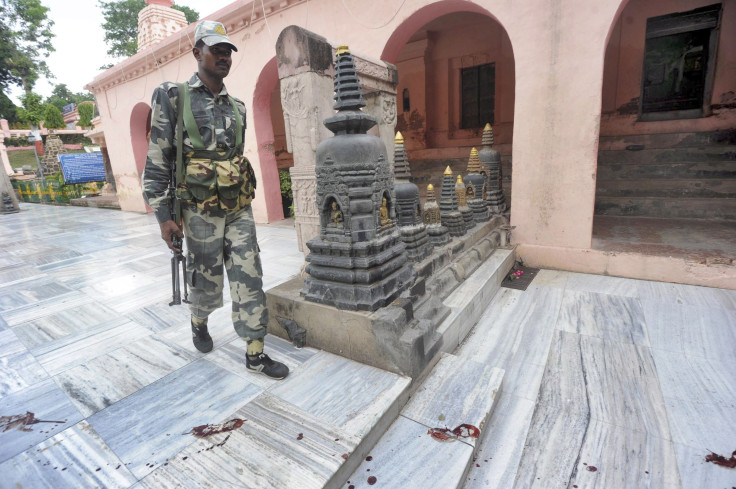Bodh Gaya Temple: Who Would Want To Damage Buddhism’s Holiest Shrine?

Indian investigators and police officials are combing through evidence at the Mahabodhi temple in Bodh Gaya in Bihar to determine who would seek to damage the holiest shrine in Buddhism by setting off at least ten low-intensity bomb blasts at the site.
Officials from the National Security Guard reported to the Home Ministry that the blasts, which wounded two monks, operated like improvised explosive devices and were activated by analog clock timers. The crude home-made bombs comprised ammonium nitrate and sulphur and were packed in small cylinders, NSG said. No one was killed in the blasts, although some windows and doors were damaged.
Outlook India reported on Monday that the National Investigation Agency detained a man in connection with what is being described by authorities as a “terrorist attack.” The Director General of Police of Bihar identified the suspect as Binod Kumar Barachatti – he was picked up because his voter identity card was found inside the temple after the explosions. However, it is unclear if Barachatti was involved in the attack or what his affiliations are.
India Today reported that a second man, identified as Anwar Hussain Mullick, reportedly a member of the Indian Mujahideen (IM) terrorist group, was arrested in Kolkata in connection with the blasts.
The temple at Bodh Gaya lies at the very heart of the Buddhist faith – Siddhartha Gautama, the Lord Buddha himself, is believed to have attained enlightenment under the Mahabodhi Tree inside the temple. The tree (a descendant of the original one that the Buddha sat under) itself wasn't damaged. The temple was declared a World Heritage site by UNESCO in 2002.
The attacks were widely condemned by Indian and global politicians, including Congress Party leader Sonia Gandhi. Bihar's Chief Minister Nitish Kumar said the incident "deserve strongest condemnation in strongest possible words as the perpetrators targeted the place of religious faith of people with an aim to create fear among them.”
Security officials have upgraded their presence at other Buddhist shrines across India in response to the Bihar bombing. As of Monday, no group has taken responsibility for the bombings. Indian media has speculated who the culprits might be.
Bihar police officials suspect that members of the Maoist Naxalite movement, who've waged an insurgency against the Indian government for more than 40 years and are particularly active in the northeastern part of the country, might have attacked the temple. The Naxalites, who had been dormant for years, appear to have enjoyed a resurgence launching strikes in areas in and around Bihar.
Inspired by the Chinese Communist revolution of Chairman Mao Tse-Tung, the Naxalites have demanded land and jobs for impoverished farmers and the poor. They also want India to become a Communist state. “The use of cylinders with crude timers to set off Bodh Gaya blasts is another Red (Maoist) signature as [is] also the fact that the bombs were placed at Temple Complex peripherals, indicating that a massacre was not intended,” a security official told the Hindustan Times.
Others suggest that the Indian Mujahedeen may have been involved, as a result of spiraling Muslim-Buddhist tensions in Myanmar, where hundreds of Rohingya Muslims have been killed by Buddhist Burmese in sporadic violence for months. A Pakistani-based Islamic militant named Hafiz Saeed, the chief of Jama't ud Da'wah -- which is widely blamed for engineering the 11/26 terror attacks in Mumbai -- tweeted that the “Indian government is working in cahoots with [the] Burmese government to wipe out [the] Muslim population of Burma.”
The Hindustan Times reported that intelligence agencies in the U.S., Bangladesh and Singapore believe that some Rohingya Muslims have received training by Muslim radicals associated with another Pakistan militant group, Lashkar-e-Taiba. Such groups are reportedly seeking to attack Burmese and/or Buddhist targets in retaliation for the persecution of Rohingya Muslims in Burma. However, Bihar police note that the Indian Mujahedeen have no links at all with the Muslims in Burma, rendering that theory unlikely.
© Copyright IBTimes 2024. All rights reserved.











